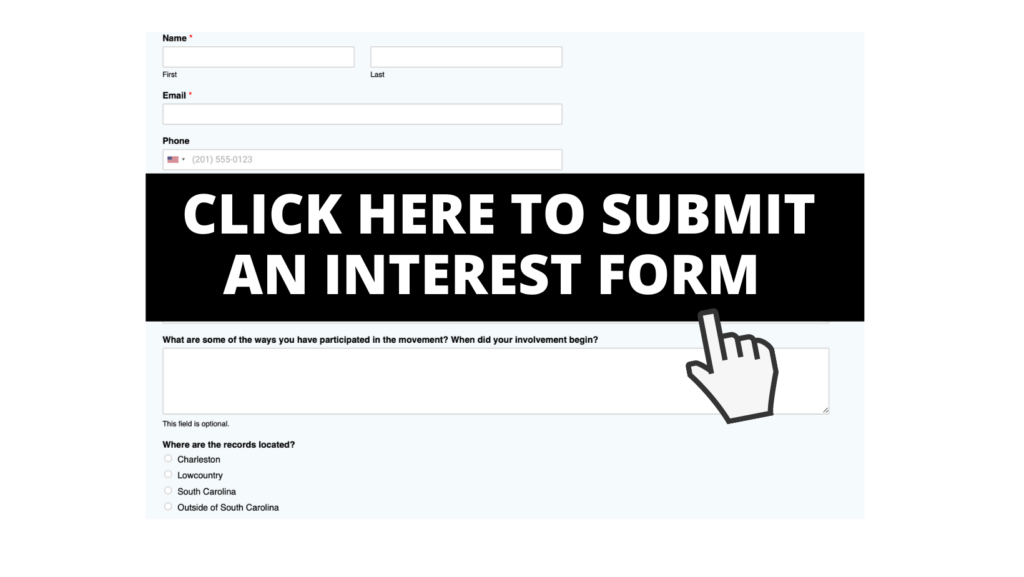Documenting the Arc – Community Portal
About the Documenting the Arc Project
<br>
<br>
The Avery Research Center recognizes the need to be actively engaged in the collection of stories and records of the current civil rights movement. The Documenting the Arc project is an attempt to do just that. In 2021, the Avery Research Center received a grant from the Gaylord and Dorothy Donnelley Foundation to conduct and make available video oral history interviews and a community submission portal.
<br>
The project is interested in those who answered the call for justice between 2014 and 2020, beginning with the formation of Black Lives Matter Charleston in late 2014 through the local George Floyd protests of 2020, emphasizing on the period between the killing of Walter Scott and the massacre at Mother Emanuel AME Church.
<br>
Documenting the Arc has two parts: Video Oral Histories and the Community Submission Portal.
<br>
Part One: Video Oral Histories
<br>
Individuals will be invited to participate in this part of the project by the Documenting the Arc Community Advisory Board. Selection criteria includes Millennials, Generation Z, and veteran activists and organizers who advised and actively participated in grassroots demonstrations and organizing efforts during the specified time period.

Filmmaker, director and videographer Jason Gourdine discusses his role in the local movement
during his “Documenting the Arc” interview.
<br>
<br>
Part Two: Community Submission Portal
<br>
<br
We realize we are not able to interview everyone who participated in these efforts as a part of this project. Therefore, we are inviting you to share poetry, short stories, photographs, protest signs, unique songs, or anything else that illustrates the movement, your story or the story of your loved ones, friends, and community members. These archival submissions will help guide future collecting and interviewing initiatives.
<br>
The archival collection process has two phases:
<br>
- Community Interest Form: This form will let the project team know that you are interested and what type of information and/or records you are interested in donating to include in the Documenting the Arc collection.
- Donation Form: Once the interest form has been reviewed, an Avery team member will reach out to you with additional details regarding your potential donation.

<br>
Frequently Asked Questions
<br>
How often/frequently can I submit?
You may submit feedback and/or interest as often as you like. There is no limitation on the number of times you can fill out the interest form.
Are submissions anonymous?
Submissions can be anonymous if you choose this option on the form. Email addresses are collected automatically for metadata purposes and will not be used to publicly identify participants.
What formats are you interested in collecting?
We are accepting any standard format, so please feel free to submit content in whichever format you are most comfortable (word documents, links to your blog posts, digital images of protest signs, artwork, video, etc.).
When should I submit? [Portal has been extended]
The community submission portal will close on June 30, 2022.
When should I expect a response to the form?
You should receive a response from the project team within 60 days.
What shouldn’t I submit? / How to protect yourself and others
- Please do not identify individuals or submit information that could be used to identify individuals who took part in any protest activity. Our aim is to protect the identities of all those involved.
- Please be considerate of the privacy of protest participants and do not submit photographs of anyone without their expressed consent.
- To protect the identities of those involved, it is recommended to use an image scrubber on any photographs of protest activity. An image scrubber will wipe any metadata from the image that can be used to identify the origins of the photograph. It can also be used to blur faces and other identifying information in the photograph. Follow this link to use a free image scrubber and find detailed instructions on how to use it: https://everestpipkin.github.io/image-scrubber/
- It is important to protect your anonymity and the anonymity of others. It is also important to protect your data. Theft, damage, and confiscation are a few of the dangers to your data. The data on your devices can be used to target people for surveillance and repression. Here is a link to some tips on how to protect yourself and your devices before, after, and during a protest: https://ssd.eff.org/en/module/attending-protest
<br>
Resources
<br>
More Information About Documenting the Arc:
https://library.cofc.edu/avery-documenting-the-arc-oral-history-project/
Protest in the Archives:
https://bmrc.lib.uchicago.edu/resources/protest-archives/
Archiving the Black Lives Matter Movement:
https://uark.libguides.com/c.php?g=1050881&p=7641646
Black Carolinians Speak: Portraits of a Pandemic:
https://greenbookofsc.com/speak/
Race and Social Justice Research Guide:
https://libguides.library.cofc.edu/raceandsocialjustice/SJCH
